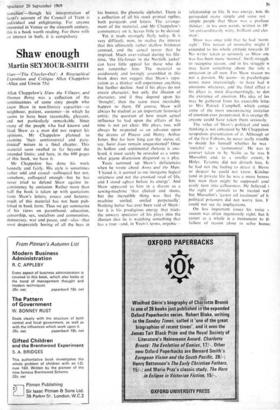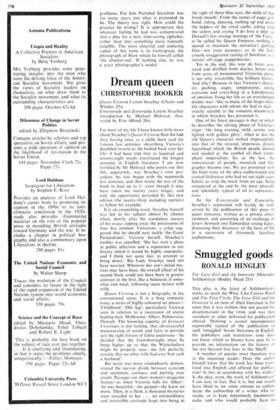Shaw enough
Martin SEYMOUR-SMITH
Shaw-7he Chucker-Out': A Biographical Exposition and Critique Allan Chappelow (Allen and Unwin 75s) Allan Chappelow's Shaw the Villager, and Human Being was a collection of the reminiscences of some sixty people who knew Shaw in non-literary capacities—as neighbour, patient, customer—in which he seems to have been reasonable, pleasant, and not particularly remarkable. Since many of the people who had known and liked Shaw as a man did not respect his opinions, Mr Chappelow planned to examine 'their controversial and para- doxical' nature in a final chapter. This material soon swelled to far beyond the intended limits; and here, in the 600 pages of this book, we have it.
Mr Chappelow has done his work honestly and fairly. His style is sometimes rather odd and casual—colloquial but not, somehow, colloquial enough—but he has never tried to defend Shaw against in- consistency by omission. Rather more than half the book is taken up with quotations from Shaw's letters, essays and lectures; much of this material has not been pub- lished in book form. Thus we get summaries of his views on parenthood, education, censorship, sex, socialism and communism, democracy, war and peace, and—alas—that most desperately boring of all the bees in his bonnet, the phonetic alphabet. There is a collection of all his stock printed replies, both postcards and letters. The arrange- ment of the material, and Mr Chappelow's commentary on it, leaves little to be desired.
Yet it reads strangely flatly today. It is very difficult, now, to realise the interest that this ultimately rather shallow Irishman aroused, and the actual terror that he inspired. Much over-valued during his life- time, 'the life-forcer in the Norfolk jacket' can have little appeal for those who do not remember him. The material so assiduously and lovingly assembled in this book does not suggest that Shaw's repu- tation as a thinker will experience anything but further decline. And if his plays do not create character, but only the illusion of character, and if they depend upon his `thought', then the same must inevitably happen to them. Of course, Shaw will always be studied as an important historical entity; the question of how much actual influence he had upon the affairs of his time is not yet clear. His plays, too, will always be respected as an advance upon the drama of Pinero and Henry Arthur Jones. But for how long can the status of, say, Saint Joan remain unquestioned? Once its hollow and sentimental rhetoric is ana- lysed, it must surely be revealed as a some- what jejune discussion disguised as a play.
Yeats summed up Shaw's deficiencies when he wrote about Arms and the Man: 'I hated it, it seemed to me inorganic logical strictness and not the crooked road of life, and I stood aghast before its energy'. And Shaw 'appeared to him in a dream as a sewing-machine 'that clicked and shone, but the incredible thing was that the machine smiled, smiled perpetually'. Nothing better has ever been said of Shaw: for it is his prodigious energy that tricks the unwary spectator of his plays into the illusion that he is watching something that has a true—and, in Yeats's terms, organic- relationship to life. It was energy, too, the persuaded many simple and some not simple people that Shaw was a profour thinker: in his own words, written in in 'an extraordinarily witty, brilliant and deli man'.
Shaw was once told that he had 'norm sight'. This notion of normality might t extended to his whole attitude towards lif No writer taken as seriously as Shaw one was has been more 'normal'. Swift struggk to recognise reason, and in his struggle w may learn something about the role c unreason in all men. For Shaw reason wa not a passion. He seems—in psychologicz terms most interestingly—to have had n emotions whatever, and the final effect o his plays is, most disconcertingly, to den the existence of emotion. His idea of lov may be gathered from his execrable letter to Mrs Patrick Campbell, which contai some of the most unconvincing imitatior of emotion ever perpetrated. It is strange th: anyone could have taken them seriously.
The value of Shaw's political and soci: thinking is not enhanced by Mr Chappelow scrupulous presentation of it. Although or of the first Fabians, he never really trouble to decide for himself whether he was : 'socialist' or a 'communist'. He was (c course) taken in by Stalin as he was b Mussolini and, to a smaller extent, b Hitler. Tyranny did not disturb him, fc he had not the feeling to detest it. Horrc or despair he could not know. Kindne5 (and in private life he was a more benevt lent man than might be supposed) coul easily turn into callousness. He believed i the right of animals to be treated wel but Mussolini's 'castor oil treatment' of If political prisoners did not worry him. I-' could not see its implications.
On less important issues his voice 4. reason was often ingeniously right; but h career as a whole is a monument to th failure of reason alone to solve humai.
problems. For him National Socialism was for many years just what it pretended to be. The theory was right. How could the practice be wrong? It is appropriate that whatever feeling he had was concentrated into a plea for a new, time-saving alphabet, rather than into something more humanly tangible. The most cheerful and enduring aspect of this tome is its frontispiece, the photograph of Shaw which he himself called `the chucker-out'. If nothing else, he was a great photographer's model.









































 Previous page
Previous page